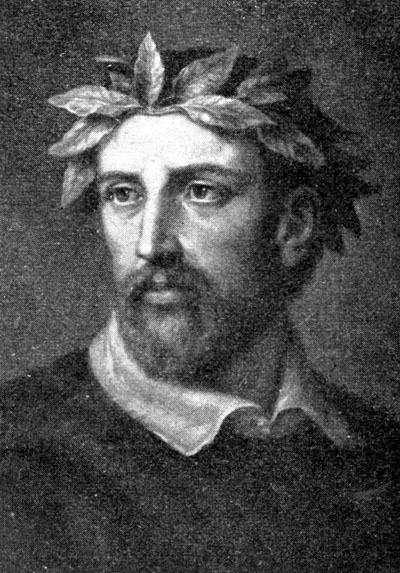
Poet laureate
A poet laureate (plural: poets laureate)[1][2][3] is a poet officially appointed by a government or conferring institution, typically expected to compose poems for special events and occasions. Albertino Mussato of Padua and Francesco Petrarca (Petrarch) of Arezzo were the first to be crowned poets laureate after the classical age, respectively in 1315 and 1342.[4] In Britain, the term dates from the appointment of Bernard André by Henry VII of England. The royal office of Poet Laureate in England dates from the appointment of John Dryden in 1668.
In modern times a poet laureate title may be conferred by an organization such as the Poetry Foundation, which designates a Young People's Poet Laureate, unconnected with the National Youth Poet Laureate and the United States Poet Laureate.[5]
The office is also popular with regional and community groups. Examples include the Pikes Peak Poet Laureate,[6] which is designated by a "Presenting Partners" group from within the community, the Minnesota poet laureate chosen by the League of Minnesota Poets (est. 1934),[7] the Northampton Poet Laureate[8] chosen by the Northampton Arts Council,[9] and the Martha's Vineyard Poet Laureate chosen by ten judges representing the Martha's Vineyard Poetry Society.
Over a dozen national governments continue the poet laureate tradition.
Background[edit]
In ancient Greece, the laurel was used to form a crown or wreath of honour for poets and heroes. The custom derives from the ancient myth of Daphne and Apollo (Daphne signifying "laurel" in Greek), and was revived in Padua for Albertino Mussato,[10] followed by Petrarch's own crowning ceremony in the audience hall of the medieval senatorial palazzo on the Campidoglio on April 8, 1341.[11] Because the Renaissance figures who were attempting to revive the Classical tradition lacked detailed knowledge of the Roman precedent they were attempting to emulate, these ceremonies took on the character of doctoral candidatures.[12]
Since the office of poet laureate has become widely adopted, the term "laureate" has come to signify recognition for preeminence or superlative achievement (cf. Nobel laureate). A royal degree in rhetoric, poet laureate was awarded at European universities in the Middle Ages. The term therefore may refer to the holder of such a degree, which recognized skill in rhetoric, grammar, and language.
By country[edit]
Australia[edit]
On 30 January 2023, at the launch of 'Revive', Australia's new cultural policy, Prime Minister Anthony Albanese announced “the establishment of a poet laureate for Australia”.[13] Before 2023, Australia had not had an official poet laureate scheme, despite past suggestions.[14][15] In 1818, former convict Michael Massey Robinson was paid by colony governor Lachlan Macquarie for services as poet laureate.[16] Over the years, other poets have been nominated as worthy of such a title, including James Brunton Stephens (1835–1902),[17] Andrew Barton 'Banjo' Paterson (1864–1941),[18] and Les Murray (1938–2019).[19]
Barbados[edit]
The first Poet Laureate of Barbados was chosen in 2018. Her name is Esther Phillips.[20][21]